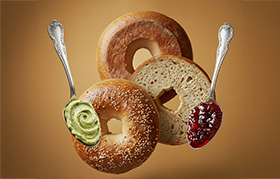
FRENCH LUXURY FOODS FIRMS BET ON INNOVATION WHILE PRESERVING TRADITION
By KATIE CATILLAZ, SWITA CHARANASOMBOON, MUNISH GUPTA, DEEPTI, TANUKU, ALEXANDRA THOMSON and VASIL TOPUZOV
A version of this article was originally published by Knowledge at Wharton
Innovation is becoming a clear market trend as French luxury goods companies, long seen as the guardians of centuries-old tradition and quality, face the pressure to change. Today's market realities -- the maturation of the European marketplace, the consolidation of key industry players and the increased focus on East Asia's growing economies and newly affluent consumers -- have forced these firms to reconsider their strategy and reinvent themselves.
The battle for the luxury goods consumer has intensified, bringing the trade-off between innovation and tradition front and center.
Fauchon's flagship luxury grocery store in Paris is a pilgrimage destination for luxury foods aficionados. Located in Place de la Madeleine, it is, according to some, a more popular tourist destination than the famous church that lends its name to the square. Founded in 1886 by pushcart grocer Auguste Fauchon, the house of Fauchon has achieved a fine balance of innovation and tradition for over a century.
Fauchon has experienced both the ups and downs of being a hallmark of French luxury foods in a global arena. During the 1990s, in an attempt to boost profitability, Fauchon entered the mass-market retail space and began distributing to supermarket chains such as Carrefour. The result was lukewarm. As prices were slashed by as much as 20 percent and new product lines designed for the mass market were rolled out, the company faced criticism over brand equity dilution. Ignoring claims that it was spreading itself too thin, Fauchon followed a tried-and-true approach by increasing its foreign presence, a move financed by a private equity consortium that acquired Fauchon in 1998.
The acquisition proved less successful than expected.
Following struggles in the 1990s, experts agreed that Fauchon needed a new wave of rejuvenation that would also preserve the company's core competencies. When Michel Ducros, an icon in the luxury foods business in France, acquired a majority stake, reinvention became a priority. Ducros recruited a dynamic new chief executive, Isabelle Capron. Capron's mission focused on developing a two-part strategy -- first, re-centering the brand on its traditional strengths and, second, using this new brand to consolidate market share in France while increasing market share in fast-growing international markets.
Fauchon's successful brand reincarnation was a careful balance between venerated tradition and the "avant garde." Renovation of Fauchon's two stores at Place de la Madeleine was completed in 2005, achieving an ultra-modern look. Its advertising campaign is highly eroticized, with widespread circulation in high-fashion magazines such as Vogue centered on the concept of "Fauchon on your lips." In one stroke, Fauchon was able to distinguish itself from the competition.
The second part of the investment strategy focused on international expansion and differentiation. To reinforce Fauchon's pre-eminence in France and export it to growing markets in Japan, China, Korea and the Middle East, Ducros made a simple press statement: "We have to move fast." The new, ultra-chic store concept was exported to all of Fauchon's international locations, comprising 36 countries with 451 points of sale. At the top of this export strategy was China, where in 2007 Fauchon opened its largest retail space in Beijing.
Fauchon's rebranding and internationalization campaign has borne fruit. Sales for 2006 were 38 million euros, representing a 21 percent organic growth over the previous year. Its net loss shrank to only 5 million euros in 2006; and in 2007 Fauchon executives expected the company to return to profitability.
Amid a constantly shifting market both at home and abroad, Fauchon's rebranding campaign has helped it remain relevant and return to profitability. Its recipe for success in the future is to remain ahead of its customers and continue to surprise them.
Not all French luxury foods brands have undergone radical changes to remain competitive. In contrast to Fauchon, Poilane, a Parisian high-end bakery, has not strayed far from its product, location, advertisement or management structure since its founding 76 years ago. Retaining its position of market leadership in a niche market has helped it successfully grow its presence and weather more than one economic downturn in the past.
Specializing in bread and simple pastries, Poilane is most famous for a round, two-kilogram sourdough country bread referred to as a "miche" or "pain Poilane." Celebrated in France, Poilane continues to operate under the watchful eyes of its clients who value its small, family-owned identity. With its unassuming storefront, neutral product colors and lack of advertisement, Poilane quietly embraces tradition. Within the context of companies that are considering internationalizing with a fresher brand image, Poilane's solid embrace of its traditional French food house identity and family roots is a different kind of innovation.
Poilane stands as a success story in French luxury foods today. According to Businessweek, sales have grown steadily in recent years from 11.6 million euros in 2001 to 15 million euros in 2007. Relying on word of mouth in lieu of advertising, Poilane has also succeeded in growing its customer base both within and outside of France. Currently 20 percent of the company's output is shipped abroad, including half a million loaves that are sent via FedEx to customers and resellers around the world.
Perhaps Poilane is one of the lucky companies that, due to their well-established market niche, do not need to innovate to survive. In fact, any change to the Poilane image may cause more damage than good.
Yet, like others in the luxury foods industry, Poilane is facing competition, in particular from mass market retailers such as the Pain Paul bakery chain. In the face of this competition, Poilane's current strategy has been to remain focused on its traditional niche brand.
The most important strategy for luxury goods businesses is protecting competitive advantage at all costs -- whether it is the excitement of continuous innovation, in the case of Fauchon, or Poilane's No. 1 position in a niche market. In addition, Asia as a consumer center has created new challenges but provides a much-needed lifeline and an expansion strategy that will no doubt be replicated in other emerging luxury goods markets.
Katie Catillaz, Swita Charanasomboon, Munish Gupta, Deepti Tanuku, Alexandra Thomson and Vasil Topuzov are members of the Lauder Class of 2010.
15,000개의 아티클을 제대로 즐기는 방법
가입하면, 한 달 무료!
걱정마세요. 언제든 해지 가능합니다.
Copyright Ⓒ 동아비즈니스리뷰. All rights reserved. 무단 전재, 재배포 및 AI학습 이용 금지
인기기사
 경제·경영 질문은
경제·경영 질문은
Askbiz에게 물어보세요
회원 가입만 해도, DBR 월정액 서비스 첫 달 무료!
15,000여 건의 DBR 콘텐츠를 무제한으로 이용하세요.










